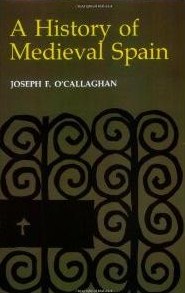Joseph F. O'Callaghan
A History of Medieval Spain

One of the best history books I've ever read. You might expect a history of Spain, from the invasion of the Muslims in 711 to the unification of most of Spain (Roman Hispania) under the Catholic kings, around 1479, would be a hard indeed thing to narrate. And you'd be right, especially when that history covers different kingdoms, peoples of diverse languages, and of the three monotheistic religions, all living in one and the same peninsula. Also, if that book aspires to cover all aspects of the lives of these nations, from the governmental, social, cultural, economical, what have you... well, the author achieves a monumental success. The impression left on the reader is like the view you get from a plane flying not too high: you see perfectly what the country looks like and how it goes changing colors and shapes in just a matter of minutes. So I see Spain in this book that covers the medieval era. Do you need to know about Spain previous to reading this book? It would definitely help to have an idea of its geography and of its peoples, but not more than a few tourist notions and you're ready to go. But go slow. Go back if you have to, underline, take notes as I did. This book, however thick it is, is just an invitation to pick your favorite stories and go deep on them later on, in other books. I picked a lot of interesting subjects myself that I can't wait to find the right book to go into deeper. Just a few events and names for instance: the Mendoza, Castro or Lara families; the continuous struggle of the magnates with the crown for eminence is very interesting, especially in the beginning of the reconquest, when reconquest and colonization provided such a great time for opportunities for individual entrepreneurship, for acquiring fame, honor and advancing in life, perhaps even from rural poverty to nobility, in those times you made your own destiny; of course when the reconquest was over, the changes for individuals without means to progress (the progress that is real progress, not like getting more welfare, if you understand me) was also over. Exit the individual, enter the government.
As I was saying, there are plenty of things that will interest you to the point of encouraging you to do further reading and investigating. The lives of adventurers, Venetians, Genoese, mercenaries like the German Roger de Flor, who started the Catalan Company; the life and times of the Cid; the rivalries among members of the crown to inherit the thrones, to the point of brothers killing brothers and sons shunning their regent mothers; the political alliances between kingdoms; and the whole mingling of newcomers with the natives: Visigoths with Romans; European pilgrims and crusaders settling down here with native Spaniards; new African invasions of Muslims with previous waves; Christians who converted to keep their possessions and lives among the Muslim invaders, and vice versa... man there's a lot of amazing stuff in Spain's history to get a hold of.
The author deals very intelligently with all these issues. He goes by chronological stretches, first minding the main events, kings, main battles or events in each kingdom; then goes on to the economics, or the government, then the cultural stuff, and so on. Then goes again into another stretch of time and does the same. But he never gets you mixed up so as to not know if you are reading about Castile, Portugal, Navarre or about Aragón, and without having to break down the time stretch into too little subsections, which would make the reading confusing and hard to follow. The man has a knack for organization, I have to admit.
Finally, I saw no political bias, no applying our modern standards to older times. History for real, where the author goes unnoticeable.
For fans of history in general. A treat.
As I was saying, there are plenty of things that will interest you to the point of encouraging you to do further reading and investigating. The lives of adventurers, Venetians, Genoese, mercenaries like the German Roger de Flor, who started the Catalan Company; the life and times of the Cid; the rivalries among members of the crown to inherit the thrones, to the point of brothers killing brothers and sons shunning their regent mothers; the political alliances between kingdoms; and the whole mingling of newcomers with the natives: Visigoths with Romans; European pilgrims and crusaders settling down here with native Spaniards; new African invasions of Muslims with previous waves; Christians who converted to keep their possessions and lives among the Muslim invaders, and vice versa... man there's a lot of amazing stuff in Spain's history to get a hold of.
The author deals very intelligently with all these issues. He goes by chronological stretches, first minding the main events, kings, main battles or events in each kingdom; then goes on to the economics, or the government, then the cultural stuff, and so on. Then goes again into another stretch of time and does the same. But he never gets you mixed up so as to not know if you are reading about Castile, Portugal, Navarre or about Aragón, and without having to break down the time stretch into too little subsections, which would make the reading confusing and hard to follow. The man has a knack for organization, I have to admit.
Finally, I saw no political bias, no applying our modern standards to older times. History for real, where the author goes unnoticeable.
For fans of history in general. A treat.
